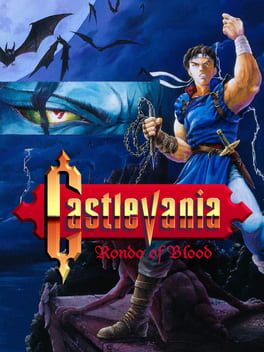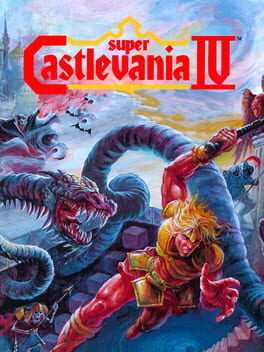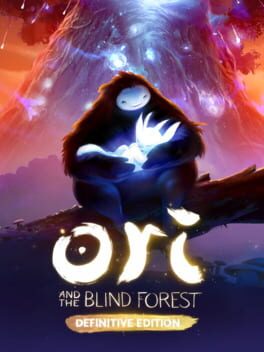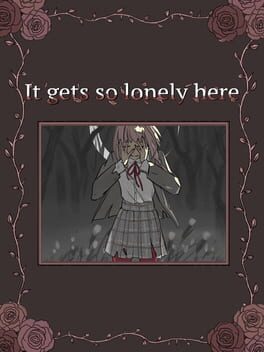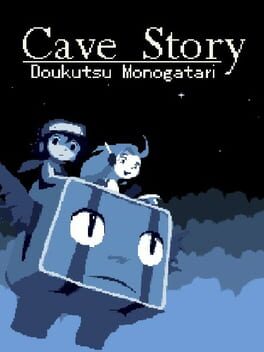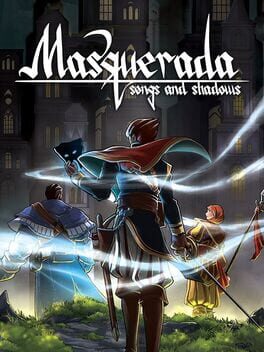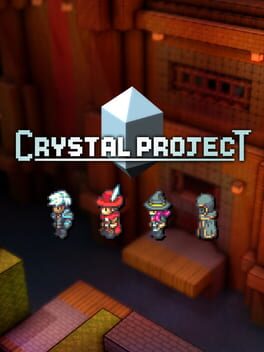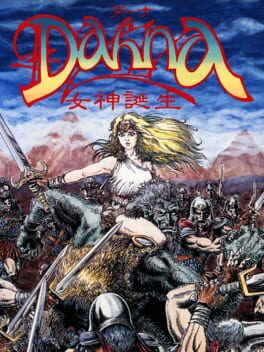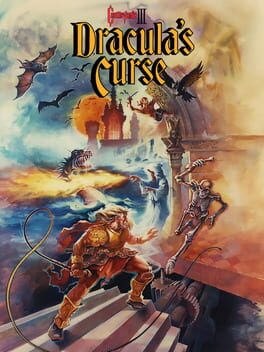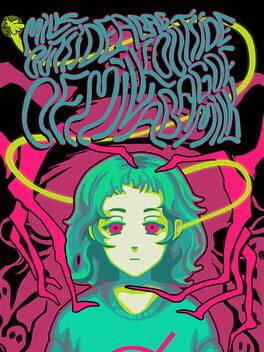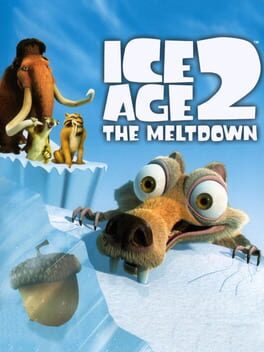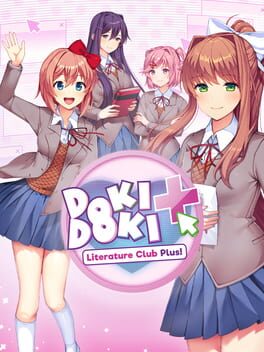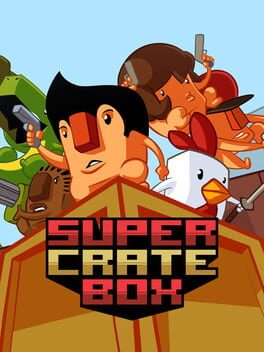ViviMayoi
For sure the best entry in the series pre-PlayStation era. If not for the difficulty being a bit low, I'd have nothing bad to say about this game. The level design is great, the music slaps the whole way through, the stages are beautiful and varied... Gameplay-wise, Richter and Maria both offer fun and meaningfully different playstyles, which really helps cement this game as my favorite classic Castlevania title.
1991
This game is a much more fluid take on the classic Castlevania gameplay, but it still has a lot of weird design decisions and loves blindsiding the player at times. The game is beautiful-looking and -sounding, with a lot of cool new concepts and a more complete toolkit for Simon compared to the previous games. Some strangely frustrating level design and a harsh difficulty curve gets in the way of enjoying SCv4 to the fullest, but it's still good fun.
Ori and the Blind Forest is a great platformer, but it might be lacking in combat systems and replayability if those are things you care about in metroidvania games.
The platforming itself feels great, with every new mechanic you get access to throughout the game lending itself very well to making movement feel fluid and seamless. Combat is a bit on the dull side, with very few differing enemy designs across the whole game, the player often getting to meet reskinned enemies with slightly different behavior and upgraded stats as they progress. As such, there are no bosses, with chase sections that test your platforming skills taking their place. This admittedly fits the game's strengths to a T.
Outside of gameplay, the game's visuals, sound design, OST and the storytelling complement each other perfectly to deliver a great atmosphere and make the forest of Nibel feel alive. Exploring the wilderness is made very intuitive thanks to how the in-game map functions, though it might make it a bit too easy if exploring is what you enjoy most out of a metroidvania.
Very fun, and I'll likely play it again! For sure recommend it.
The platforming itself feels great, with every new mechanic you get access to throughout the game lending itself very well to making movement feel fluid and seamless. Combat is a bit on the dull side, with very few differing enemy designs across the whole game, the player often getting to meet reskinned enemies with slightly different behavior and upgraded stats as they progress. As such, there are no bosses, with chase sections that test your platforming skills taking their place. This admittedly fits the game's strengths to a T.
Outside of gameplay, the game's visuals, sound design, OST and the storytelling complement each other perfectly to deliver a great atmosphere and make the forest of Nibel feel alive. Exploring the wilderness is made very intuitive thanks to how the in-game map functions, though it might make it a bit too easy if exploring is what you enjoy most out of a metroidvania.
Very fun, and I'll likely play it again! For sure recommend it.
I really like the writing in this. The way the story is narrated gives a really strong impression, what with the snarky, overly familiar narrator addressing the protagonist directly in second person. The aesthetic of it all is just amazing, with a captivating soundtrack and visuals that range from charming to haunting, but always remain beautiful.
Saying more without spoiling the experience would be difficult, so I'll just assure you that this is as good as it is gay!!
Saying more without spoiling the experience would be difficult, so I'll just assure you that this is as good as it is gay!!
2004
Still a quintessential indie platformer!
It took me a while to get around to beating this. This playthrough was my third time attempting to clear the game, as both of my previous goes at it got interrupted by PC issues, years ago... and it was so, so worth it to have another try at it.
The platforming feels tight, the level design is great and intuitive, the world is charming, the soundtrack hits hard, and the bosses are super fun; this game's got pretty much everything you could want in a platformer.
The final section needed to achieve a good ending is a huge step up in difficulty from anything else in the game, though. While I was okay with it, I could see it being daunting or frustrating for some. It was a lot of fun to learn and master the game's final level, and that last hit on the final phase of the final boss gauntlet was as satisfying as beating a game can get :)
It took me a while to get around to beating this. This playthrough was my third time attempting to clear the game, as both of my previous goes at it got interrupted by PC issues, years ago... and it was so, so worth it to have another try at it.
The platforming feels tight, the level design is great and intuitive, the world is charming, the soundtrack hits hard, and the bosses are super fun; this game's got pretty much everything you could want in a platformer.
The final section needed to achieve a good ending is a huge step up in difficulty from anything else in the game, though. While I was okay with it, I could see it being daunting or frustrating for some. It was a lot of fun to learn and master the game's final level, and that last hit on the final phase of the final boss gauntlet was as satisfying as beating a game can get :)
Masquerada... Where do I start?
As a game, this is, at best, a very linear mix of a tactical and an action RPG. It's extremely light on the role-playing elements, though, with a small skill tree and unlockable masks being the only real character progression elements. There are no sidequests to speak of, and the world you go through is linear, not letting you explore it as you would like.
As for the combat, the tactical mechanics of it can feel a bit weird, or lacking, though I was lucky enough for it not to be a problem on my end (on Normal difficulty). Overall, it's simple, but pretty fun, especially once you get past the early game and can really play with the Elemental Tag system.
The game's presentation is for sure one of its strong suits — a fun art style, expressive characters, great voice acting, a solid soundtrack. But the game's real worth lies in its story.
The story is nothing short of excellent. The world feels real, the pacing is tight, the character writing hits all the right marks, the plot progresses satisfyingly, and it's all wrapped up in a cohesive package that deals brilliantly with the themes of regrets, grief, friendship, and standing up for what you believe in.
It's hard to say if this game is just a bit of polish or gameplay depth away from being a real gem, or if it might have been better off as a story told in another medium. Either way, I recommend this game to anyone looking to dive into a well-crafted world, filled with characters made with love, as long as you're willing to look past Masquerada's linearity.
As a game, this is, at best, a very linear mix of a tactical and an action RPG. It's extremely light on the role-playing elements, though, with a small skill tree and unlockable masks being the only real character progression elements. There are no sidequests to speak of, and the world you go through is linear, not letting you explore it as you would like.
As for the combat, the tactical mechanics of it can feel a bit weird, or lacking, though I was lucky enough for it not to be a problem on my end (on Normal difficulty). Overall, it's simple, but pretty fun, especially once you get past the early game and can really play with the Elemental Tag system.
The game's presentation is for sure one of its strong suits — a fun art style, expressive characters, great voice acting, a solid soundtrack. But the game's real worth lies in its story.
The story is nothing short of excellent. The world feels real, the pacing is tight, the character writing hits all the right marks, the plot progresses satisfyingly, and it's all wrapped up in a cohesive package that deals brilliantly with the themes of regrets, grief, friendship, and standing up for what you believe in.
It's hard to say if this game is just a bit of polish or gameplay depth away from being a real gem, or if it might have been better off as a story told in another medium. Either way, I recommend this game to anyone looking to dive into a well-crafted world, filled with characters made with love, as long as you're willing to look past Masquerada's linearity.
2022
This game takes the best things about exploration and job systems in RPGs and puts them together in a way that feels so, so right. The game has a lot of heart, has a wide, charming world and feels good to experiment in. Making up a good party with the many character customization options available (job combinations, unlocked passive effects from jobs, modifiable stat growths, equipment) feels really rewarding, too.
It can be a bit unbalanced at times, but jobs all have their chance in the spotlight in a well-composed party. Unfortunately, the story is pretty lacking, as the emphasis of the game is very much on gameplay and exploration; still, Crystal Project executes those so well. Highly recommend :)
It can be a bit unbalanced at times, but jobs all have their chance in the spotlight in a well-composed party. Unfortunately, the story is pretty lacking, as the emphasis of the game is very much on gameplay and exploration; still, Crystal Project executes those so well. Highly recommend :)
2021
This game is charmingly simple and addicting. It's kind of fascinating how different each session can feel when you can only directly control your character's movement. It's good fun to make a cool build with what the game throws at you, then relax and look at the pretty lights while everything blows up.
1991
This game has good ideas for its time, but it controls.. pretty badly. It combines beat-em-up and platforming in a way where both of them feel just okay (at the best of times). You get to drift in the air to platform better, but it controls unintuitively. There's a magic system, but there's no real control over it as what spell comes out is entirely dependent on how much magic you have available. The invincibility spell you get at 3-4 magic flashes the screen pretty badly, too. On the plus side, there's multiple sections in the game where you control one of three different mounts, shaking up the gameplay a bit, but some of those sections make it hard to tell what you should be doing to avoid getting hit. At least, the difficulty curve is pretty fair and it looks great for a Genesis game.
The best Castlevania title on the NES for sure! Goes back to the more linear, level-based style of the first game while giving the player multiple routes with different recruitable characters you can play as. Even if the game still shows its age in places, it throws less curveballs than the previous games, feels more polished, and has a banger soundtrack. Solid game.
More ambitious and polished sequel to Milk inside a bag of milk inside a bag of milk. The atmosphere is great, the writing is charming and captivating, and the girl is a really well written character. The game makes it easy to get into her headspace and understand what she goes through. Rather on the short end, but a great experience :)
2019
Was a ton of fun at first, with super fun mechanics and class design for both PvE and PvP; but the devs reworked most of how the game's progression worked, essentially removed NPCs and riddled the game with microtransactions. The game became way less interesting very fast.
Could have been a favorite of mine, but the ball was dropped pretty hard.
Could have been a favorite of mine, but the ball was dropped pretty hard.
This review contains spoilers
Doki Doki Literature Club Plus! is the definitive version of a work that was already very important to me.
The base game is a great, if a bit flawed, experience, but made with love through and through; how it acts as both a critique of and a tribute to the visual novel genre throughout, with things like dialogue that reads like a translation of a Japanese work. And while the characters didn't get to be as fleshed out as they could be in the base game — for understandable reasons, given the length and goals of the game — the very, very real experiences the cast goes through were portrayed with incredible care.
This care is brought over to this version's main new feature, the Side Stories, and made even greater. In this combination of prequel and alternate universe, you get to see how the four girls met each other, became friends, and learned to slowly, but surely, love themselves a bit more. These stories and their characters are true to life (and not in a meta sense) and crafted with utmost diligence. Having gone through the things some of them have, it was catharsis in the truest sense of the word, and I'm sure it is so for many others.
The best part of Doki Doki Literature Club! has always been the relationship between the members of the cast, and Plus! has gone beyond when it comes to that. Combined with the additional lore found in Plus and some very welcome new features such as content warnings and a picture gallery, this game has everything you could want as both an old fan revisiting the VN and someone trying to experience it for the first time.
The base game is a great, if a bit flawed, experience, but made with love through and through; how it acts as both a critique of and a tribute to the visual novel genre throughout, with things like dialogue that reads like a translation of a Japanese work. And while the characters didn't get to be as fleshed out as they could be in the base game — for understandable reasons, given the length and goals of the game — the very, very real experiences the cast goes through were portrayed with incredible care.
This care is brought over to this version's main new feature, the Side Stories, and made even greater. In this combination of prequel and alternate universe, you get to see how the four girls met each other, became friends, and learned to slowly, but surely, love themselves a bit more. These stories and their characters are true to life (and not in a meta sense) and crafted with utmost diligence. Having gone through the things some of them have, it was catharsis in the truest sense of the word, and I'm sure it is so for many others.
The best part of Doki Doki Literature Club! has always been the relationship between the members of the cast, and Plus! has gone beyond when it comes to that. Combined with the additional lore found in Plus and some very welcome new features such as content warnings and a picture gallery, this game has everything you could want as both an old fan revisiting the VN and someone trying to experience it for the first time.
2010
The unmodded, single-player version is a fun, but still repetitive, modern arcade classic. It does a lot of things right - a fun gameplay loop, solid mechanics and controls, and charming, simple visual design. However, the game's sound effects border on aggressive, and the minigun weapon's screenshake is so bad it can give you a headache.
The Super Crate Box Together mod definitely made playing it a greater experience, but the game on its own doesn't really have enough to it with only 3 types of enemies to interact with. It kept me interested long enough to try and unlock everything, but couldn't keep me hooked quite like a some arcade-style titles can.
The Super Crate Box Together mod definitely made playing it a greater experience, but the game on its own doesn't really have enough to it with only 3 types of enemies to interact with. It kept me interested long enough to try and unlock everything, but couldn't keep me hooked quite like a some arcade-style titles can.
